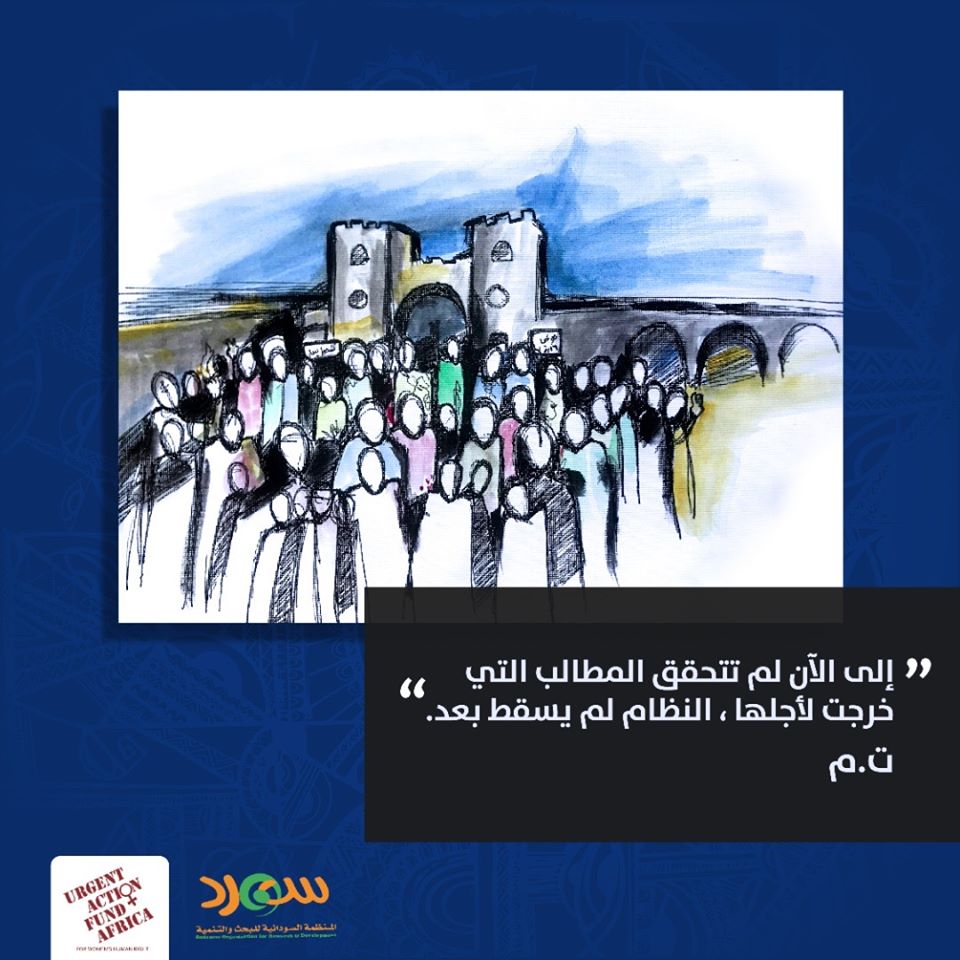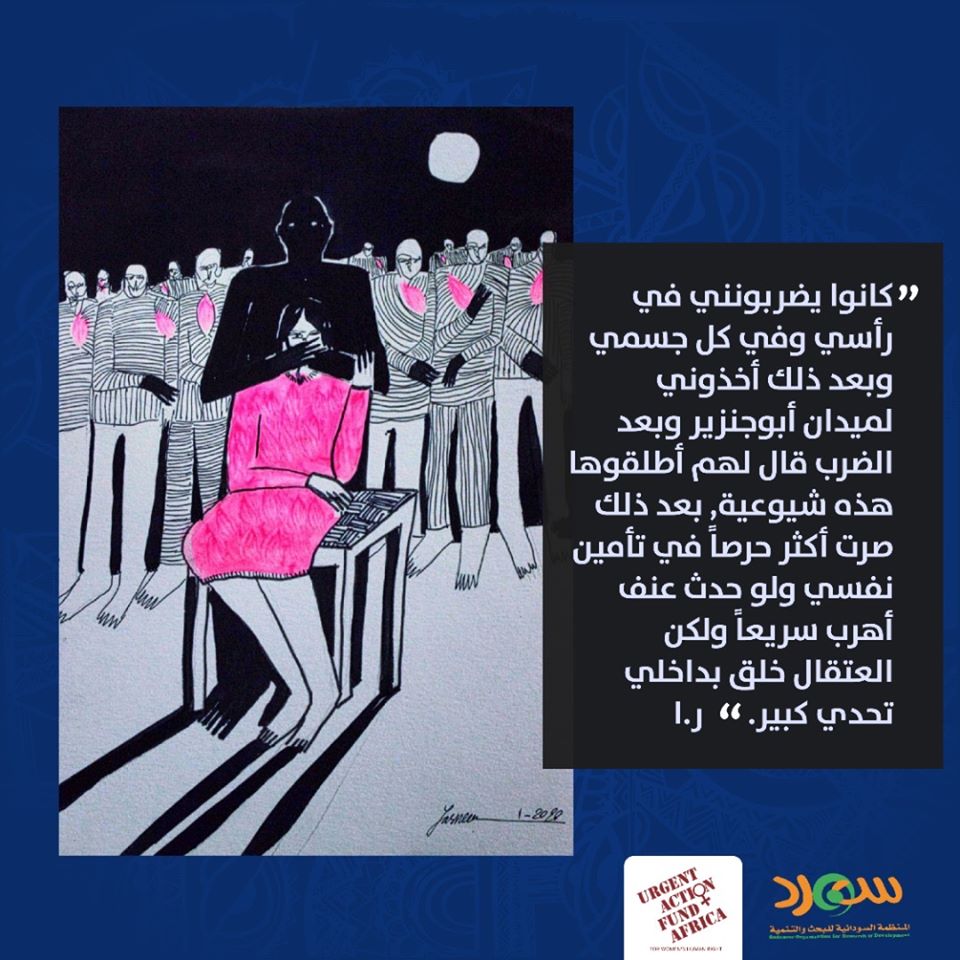Throughout the history of revolutions in Sudan, women performed a huge role in contributing to those revolutions. Despite not gaining the recognition they deserve, they continued to participate in every movement striving to better the lives of the Sudanese people. Those endless efforts earned acknowledgement and documentation in the form of a book. The book, which you can read online, strives to finally narrate the stories of resistance, pay tribute to the women leaders of the past, and empower the coming generations.
On the 7th of March 2020, the Sudanese Organization for Research and Development (SORD) launched the book “Her Resistance” featuring the stories of 100 Sudanese women who played various roles in the #SudanUprising since it started in December 2018. The book, which is available in Arabic and English, shares women’s reflections and observations from the time of the revolution and fears and hopes for the future.

Khadija ElDiwehy, the programme assistant at SORD tell us “the stories documented are not covering a specific group of women, they are stories of women from different backgrounds”. The book has diverse opinions about the revolution, focusing on women’s experiences during the protests and incidents of arrest and abuse. It considers all aspects of contribution to the revolution, and that it does not have one face, but a collective work where everyone works together to raise awareness and make a change.
The launch started with an introduction about the organization and the project, a panel discussion was conducted, filled with empowering words, and hopes for the future, the panelists; Dr Asha Alkarib, Hala Abdallah, Sawsan Ahmed, and Shinaz Ahmed, discussed the historical background of the participation of Sudanese women and girls in the previous revolutions, the social and cultural factors that influence/limit the political participation of Sudanese girls and women, and the role of women and girls in the glorious December revolution. Shinaz Ahmed, a doctor and gender issues activist, talked about women’s role in the revolution from the first ululation (celebratory whistle) to the women opening their houses to shelter others during the protests. She noted the role of women during the sit-in spreading awareness, which was recognized locally and internationally, and the importance of including women in leading roles,.
Dr. Asha Khaleel Elkarib - co-founder of SORD - explained how the December revolution was a result of “continuous resistance by women against the regime”. She elaborated that women have been resisting against many forms of oppression and participated in advocating for peace during the civil war and other conflicts. She also commended women’s initiatives that sought development and improvement of the living conditions, and the active work women have contributed in changing the laws which strip women from their rights. Dr. Asha carried on by addressing the resistance of women refugees and displaced women who were often arrested, beaten and imprisoned and how they fueled the revolution. She stated that the “women’s fight during the December revolution was a continuation of women’s resistance before and it must continue."

Sawsan Ahmed is a member of the Multi-purpose Feminist Union which was formed during the sit-in by Awadia Koko. She talked about the huge role of women and the need for Sudanese women to have freedom of speech and laws that protect their rights in society. She added that the revolution shall continue until we have our rights guaranteed. Dr Hala is a pharmacist and activist who paid tribute to women who take care of their families at home, and the ones who went out and faced many forms of restrictions to contribute to the revolution.
The Women's Day theme for 2020 is generational equality, and throughout this conducive discussion, Shinaz asked an important question “how can we learn from past generations?”. Dr Asha openly spoke about the misunderstandings between the past generations and youth, and misconceptions that youth are careless, yet she noted that those thoughts changed dramatically after the revolution. The Sudanese youth have proven that they have fresh and practical ideas, and more importantly the courage that the past generation didn't have. Dr. Asha went further and answered this question in specific points that we should follow to achieve generational understanding:
- Acknowledge that there is a miscommunication between different generations.
- Do not misinterpret or develop thoughts without a discussion.
- Allow room to understand and change stereotypical ideas.
- Listen and appreciate each other's opinions and differences.
- Organize yourself by all means, and create groups of awareness and understanding.
The challenges and problems discussed during the event were palpable to many of us in the audience who are seeing some minor changes from the social impact of the December 2018 revolution. The acknowledgement that change has happened and needs to continue to occur is eminent especially for women’s issues that continue to trouble half the population. Some minor wins were highlighted by Sawsan, who pointed out that since the revolution, tea sellers have been facing less harassment, less discrimination and racism. The road is complicated, yet stories captured by books such as “Her Resistance” continue to inspire and remind women of what was and what needs to be.
“Every woman’s story has a face of resistance, they all deserve to be acknowledged and documented.” Dr Asha Alkarib, co-founder of SORD
